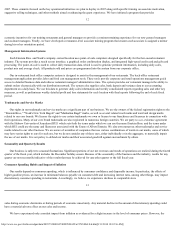Einstein Bros 2006 Annual Report Download - page 17
Download and view the complete annual report
Please find page 17 of the 2006 Einstein Bros annual report below. You can navigate through the pages in the report by either clicking on the pages listed below, or by using the keyword search tool below to find specific information within the annual report.
http://www.sec.gov/Archives/edgar/data/949373/000104746907001622/a2176540z10-k.htm[9/11/2014 10:12:36 AM]
A shortage in the labor pool or other general inflationary pressures or changes could also increase labor costs. In addition, changes in labor
laws or reclassifications of associates from management to hourly employees could affect our labor cost. An increase in labor costs could have a
material adverse effect on our income from operations and decrease our profitability and cash flows if we are unable to recover these increases by
raising the prices we charge our guests.
We may not be able to generate sufficient cash flow to make payments on our substantial amount of debt.
We have a high level of debt and are highly leveraged. As of January 2, 2007, we had $170 million in term loans outstanding and $57 million
of mandatory redeemable preferred stock. In addition, we may, subject to certain restrictions, incur substantial additional indebtedness in the future.
Our high level of debt, among other things, could:
•make it difficult for us to satisfy our obligations under our indebtedness;
•limit our ability to obtain additional financing for working capital, capital expenditures, acquisitions and general corporate
purposes;
•increase our vulnerability to downturns in our business or the economy generally; and
•limit our ability to withstand competitive pressures from our less leveraged competitors.
Economic, financial, competitive, legislative and other factors beyond our control may affect our ability to generate cash flow from operations
to make payments on our indebtedness and to fund necessary working capital. A significant reduction in operating cash flow would likely increase
the need for alternative sources of liquidity. If we are unable to generate sufficient cash flow to make payments on our debt, we will have to pursue
one or more alternatives, such as reducing or delaying capital expenditures, refinancing our debt on terms that are not favorable to us, selling assets
or issuing additional equity securities. We may not be able to accomplish any of these alternatives on satisfactory terms, if at all, and even if
accomplished, they may not yield sufficient funds to service our debt.
We must comply with certain covenants inherent in our debt agreements to avoid defaulting under those agreements.
Our debt agreements contain certain covenants, which, among others, include certain financial covenants such as limitations on capital
expenditures, maintenance of the business, use of proceeds on sales of assets and consolidated leverage and fixed charge coverage ratios as defined
in the agreements. The covenants also preclude the declaration and payment of dividends or other distributions to holders of our common stock.
We are subject to multiple economic, financial, competitive, legal and other risks that are beyond our control and could harm our future financial
results. Any adverse effect on our business or financial results could affect our ability to maintain compliance with our debt covenants, and any
failure by us to comply with these covenants could result in an event of default. If we were to default under our
20
covenants and such default were not cured or waived, our indebtedness could become immediately due and payable, which could render us
insolvent.
We face the risk of adverse publicity and litigation in connection with our operations.
We are from time to time the subject of complaints or litigation from our consumers alleging illness, injury or other food quality, health or
operational concerns. Adverse publicity resulting from these allegations may materially adversely affect us, regardless of whether the allegations
are valid or whether we are liable. In addition, employee claims against us based on, among other things, discrimination, harassment or wrongful
termination may divert financial and management resources that would otherwise be used to benefit our future performance. We have been subject
to claims from time to time, and although these claims have not historically had a material impact on our operations, a significant increase in the
number of these claims or the number that are successful could materially adversely affect our business, prospects, financial condition, operating
results or cash flows.
A regional or global health pandemic could severely affect our business.
A health pandemic is a disease that spreads rapidly and widely by infection and affects many individuals in an area or population at the same
time. In 2004, 2005 and 2006, Asian and European countries experienced outbreaks of avian flu and it is possible that it will continue to migrate to
the United States where our restaurants are located. If a regional or global health pandemic were to occur, depending upon its duration and
severity, our business could be severely affected. We have positioned ourselves as a "neighborhood atmosphere" between home and work where
























